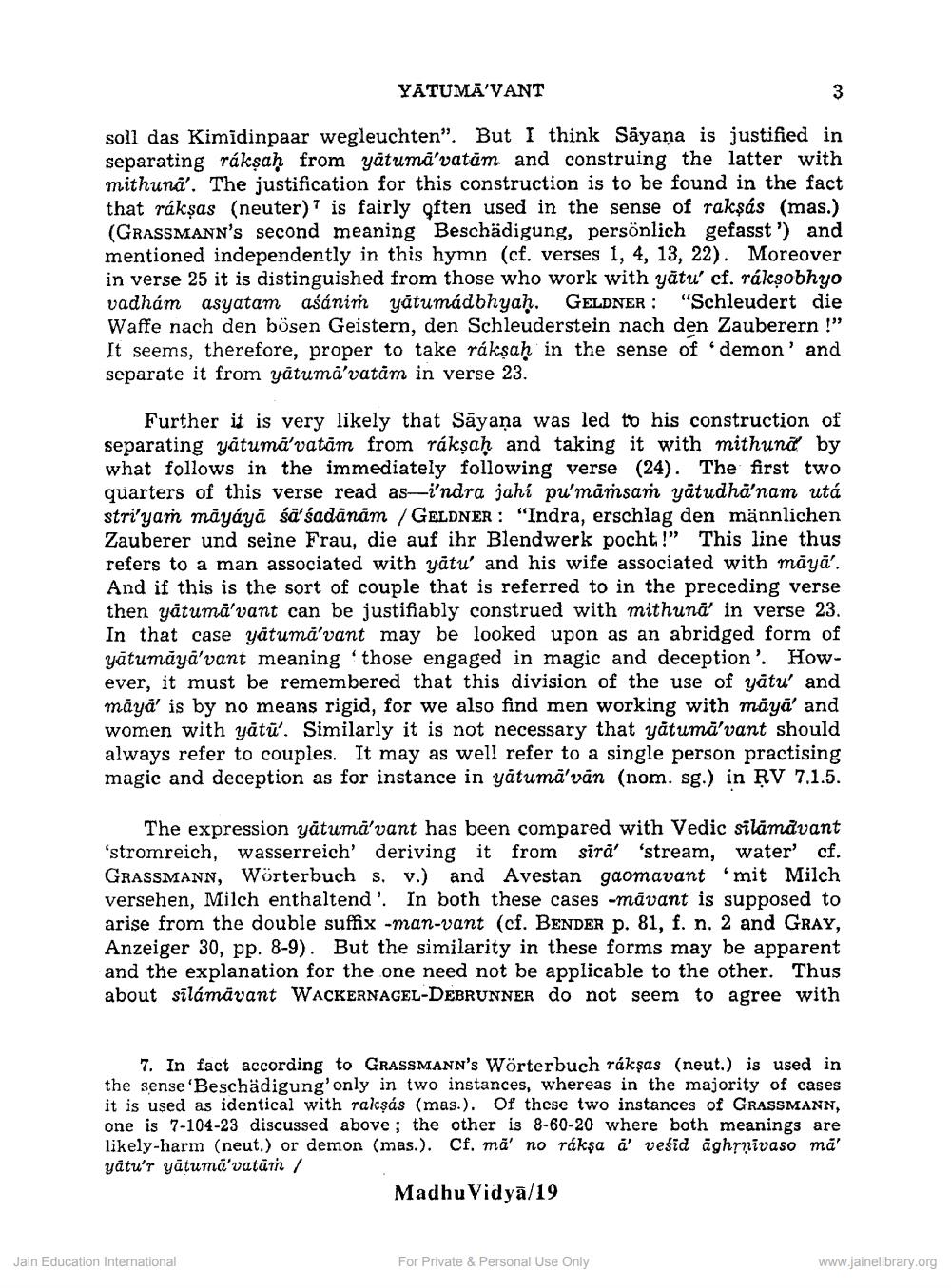________________
YATUMA'VANT
3
soll das Kimidinpaar wegleuchten". But I think Säyana is justified in separating rákṣaḥ from yātuma'vatam and construing the latter with mithuna'. The justification for this construction is to be found in the fact that rákşas (neuter)? is fairly often used in the sense of rakşás (mas.)
(GRASSMANN's second meaning Beschädigung, persönlich gefasst') and mentioned independently in this hymn (cf. verses 1, 4, 13, 22). Moreover in verse 25 it is distinguished from those who work with yātu' cf. ráksobhyo vadhám asyatam aśánin yātumadbhyah. GELDNER: "Schleudert die Waffe nach den bösen Geistern, den Schleuderstein nach den Zauberern !" It seems, therefore, proper to take ráksaḥ in the sense of demon' and separate it from yātuma'vatam in verse 23.
Further it is very likely that Sāyana was led to his construction of separating yatumā'vatām from rákṣaḥ and taking it with mithună by what follows in the immediately following verse (24). The first two quarters of this verse read as—i'ndra jahi pu'mamsan yātudha'nam utá stri'yam mayayā sā'sadānām / GELDNER: "Indra, erschlag den männlichen Zauberer und seine Frau, die auf ihr Blendwerk pocht!" This line thus refers to a man associated with yātu' and his wife associated with māyā'. And if this is the sort of couple that is referred to in the preceding verse then yātumā'vant can be justifiably construed with mithuna' in verse 23. In that case yātuma'vant may be looked upon as an abridged form of yātumāya'vant meaning 'those engaged in magic and deception'. However, it must be remembered that this division of the use of yātu' and māya' is by no means rigid, for we also find men working with māyā' and women with yātu'. Similarly it is not necessary that yatumā'vant should always refer to couples. It may as well refer to a single person practising magic and deception as for instance in yatuma'van (nom. sg.) in RV 7.1.5.
The expression yātumā'vant has been compared with Vedic silāmavant 'stromreich, wasserreich' deriving it from sira' 'stream, water' cf. GRASSMANN, Wörterbuch s. v.) and Avestan gaomavant mit Milch versehen, Milch enthaltend'. In both these cases -māvant is supposed to arise from the double suffix -man-vant (cf. BENDER P. 81, f. n. 2 and GRAY, Anzeiger 30, pp. 8-9). But the similarity in these forms may be apparent and the explanation for the one need not be applicable to the other. Thus about silámāvant WACKERNAGEL-DEBRUNNER do not seem to agree with
7. In fact according to GRASSMANN'S Wörterbuch rákşas (neut.) is used in the sense 'Beschädigung'only in two instances, whereas in the majority of cases it is used as identical with rakşás (mas.). Of these two instances of GRASSMANN, one is 7-104-23 discussed above, the other is 8-60-20 where both meanings are likely-harm (neut.) or demon (mas.). Cf. ma' no ráksa a vesid aghrnivaso ma' yatu'r yātuma'vatām /
Madhu Vidyā/19
Jain Education International
For Private & Personal Use Only
www.jainelibrary.org




